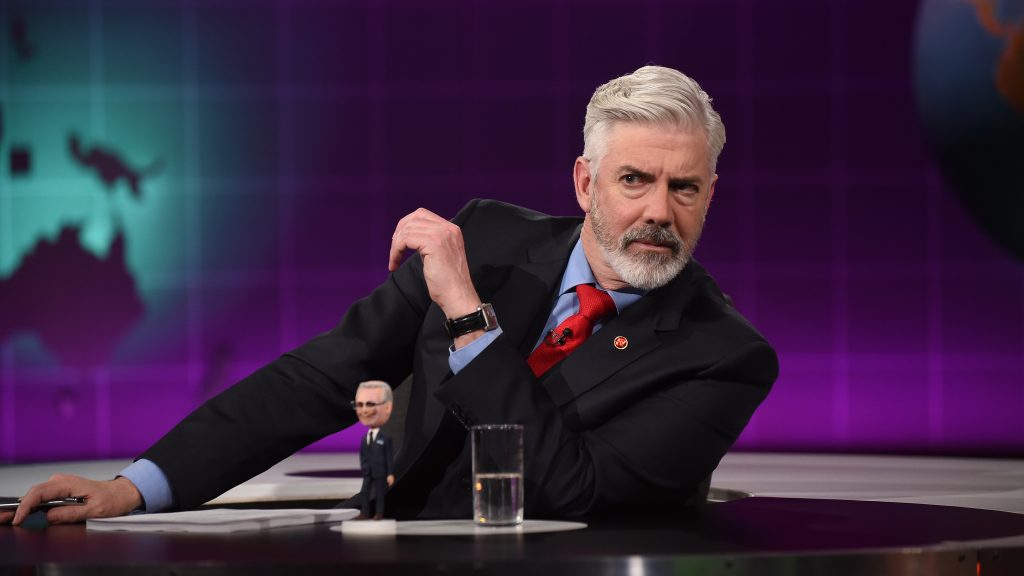Pick Up The Pace
So Mad as Hell is good; no news there. But what makes it so good? Being funny doesn’t hurt, but there are a whole lot of pathways to “being funny” and it’s not just the ones that feature Charlie Pickering that lead to dead ends. And while skewering the news doesn’t hurt either, Australia has a long and rich tradition of shithouse satire that set out to skewer the news and ended up giving half the show over to Tom Gleeson insulting people. So what’s the deal?
It’s smart, it’s insightful, it’s silly, it’s packed with pop culture references (and references in general – Dr Caligari, anyone?), Micallef now has a beard, it’s – look, for today at least we’re going to say it’s all down to pace.
We happened to re-watch an early episode of Newstopia recently – ah Inspektor Herring, we hardly knew ye – and boy howdy did it take its time between what were fairly traditional news gags. We dimly remember that, with the early episodes at least, part of the remit was to actually provide some kind of news coverage (as in, you may not have watched these stories on SBS news but maybe a few jokes will get you interested), but by comparison with Mad as Hell it was a show frozen in carbonite.
And you really can’t under-estimate the importance of pace – which is different from mere speed, which would make Family Guy the funniest show ever and not a largely incoherent firehose, but more on that later – in comedy. The faster you go the more jokes you can cram in which increases the chance that one of the jokes is going to work and once someone starts laughing it’s a whole lot easier to keep them laughing. The Willy Wonka sketch on this week’s Mad as Hell was maybe not the most original comedy idea ever (when there’s news about a chocolate factory, where else are you going to turn?), but once the “world of pure automation” line got a laugh at Tumbleweeds HQ the rest of the sketch was a slam dunk.
Which brings up another important factor: performance. Mad as Hell features a range of performers giving a variety of performances, and often the performances themselves aren’t really designed to get laughs on their own – the cast are playing characters that work in context. But when the Wonka sketch came back from the musical number and Francis Greenslade was giving his version of Gene Wilder’s twinkle in the eye, it was comedy gold – and Micallef knew it, struggling to stay silent while returning the stare. This wasn’t the kind of self-indulgent corpsing where the performers laughter is there to sell a weak joke; game recognises game, as nobody we know says.
But performance is part of the pacing. Once you can layer a good performance over a joke you have two things working for you comedy-wise, much like having Micallef say one thing while the caption on screen says another. And Mad as Hell has a lot of things working for it at once, which means that even when a joke might start with an observation that’s not the freshest – as in when Micallef wondered whether we’d get a colour chart if we brought the White Australia policy back, which sounded like it might be going the same place as this famous Family Guy joke:
But then Mad as Hell cut to the interpretive dancers and we’re off in a whole new direction yet again.
Pace also means you can cover more ground, which is… look, it’s no secret that as far as what remains of ABC management is concerned, “balance” in comedy means attacking both sides of politics relatively equally, even though one side has literally zero power over our daily lives. So there’s something of a requirement to put in material that maybe might not be prime comedy gold simply because you can’t just keep on hammering at one side all the time.
Most of the time on Mad as Hell this isn’t a problem, in part because Bill Shorten can’t help dropping the zingers – and we suspect the popularity of that particular swipe has earned Mad as Hell some minor goodwill in the Liberal corridors of power; it’s not like any gag has defined a Liberal leader anywhere near as much. But also because Mad as Hell can bring on characters from various sides of politics and have them make decent points (that line about why aren’t they complaining that a woman was sacked from running the ABC when Mad as Hell is constantly going on about the lack of women in the Liberal side of politics was a deep burn) without them dominating any one episode of the show because again, pace.
Simply put, and if we’d simply put this at the start of this post we could have all gotten on with our lives by now, pace gives you the ability to do more comedy and more with your comedy. Where a slower show is weighed down by the lame jokes required to give balance, a faster show can run through them quickly then get back to the good stuff, or have the room to try a few different angles on material from one side without having the show turn into a partisan rant. And the more things that are going on, the less likely it is that the audience’s attention is going to wander, which is important when a show is dropping in jokes that occasionally require the viewer to be paying attention.
Of course, pace means nothing if all you’re doing is firing shit jokes faster. But if we were going to start praising Mad as Hell‘s writing, we’d be here all week.


